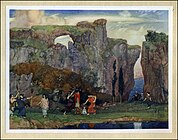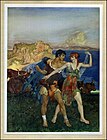Idyll XXVI
Idyll XXVI, also titled Λῆναι ('The Bacchanals') or Βάκχαι ('The Bacchantes'), is a
Dionysiac Ritual) by his mother, Agave, and other Theban women, for having watched the celebration of the mysteries of Dionysus.[2]
Analysis
According to
J. M. Edmonds, this poem may have been written to celebrate the initiation of a nine-year-old boy into the mysteries of Dionysus, through a mock slaying-rite.[1] That young children were initiated into these mysteries is, he presumes, clear from a poem by Antistius in the Anthology, which may have been written for a similar occasion; and in Callimachus Artemis asks that her maiden attendants shall be nine years old.[3][1] In this poem the father describes the slaying of Pentheus by his mother, and takes credit to himself for following her example.[1] Edmonds notes, "The slaying of the boy is the bringing of him to Dionysus, even as the eagles made Ganymede immortal by bringing him to Zeus."[1] The poem is almost certainly not by Theocritus.[1]
Illustrations
-
 Now Pentheus from a lofty cliff was watching all ... Autonoe first beheld him, ... and, rushing suddenly, with her feet dashed all confused the mystic things of Bacchus the wild
Now Pentheus from a lofty cliff was watching all ... Autonoe first beheld him, ... and, rushing suddenly, with her feet dashed all confused the mystic things of Bacchus the wild -
 'Tis for thee to caress thy kine, not a maiden unwed
'Tis for thee to caress thy kine, not a maiden unwed
See also
References
Sources
Attribution: ![]() This article incorporates text from these sources, which are in the public domain.
This article incorporates text from these sources, which are in the public domain.
- Edmonds, J. M., ed. (1919). The Greek Bucolic Poets (3rd ed.). William Heinemann. pp. 325–9.
- Lang, Andrew, ed. (1880). Theocritus, Bion, and Moschus. London: Macmillan and Co. pp. 135–7.
Further reading
- Cholmeley, R. J., ed. (1919). The Idylls of Theocritus (2nd ed.). London: G. Bell & Sons, Ltd. pp. 362–4.
External links
 Greek Wikisource has original text related to this article: Λήναι ή Βάκχαι
Greek Wikisource has original text related to this article: Λήναι ή Βάκχαι Media related to Idyll XXVI at Wikimedia Commons
Media related to Idyll XXVI at Wikimedia Commons- "Theocritus, Idylls, Λῆναι ἢ Βάκχαι". Perseus Digital Library.


